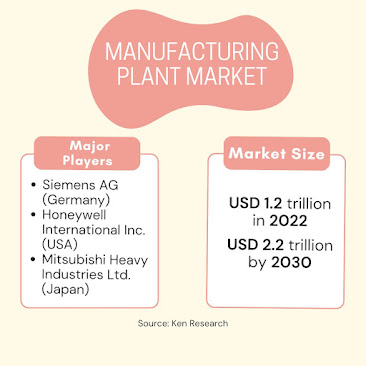The global manufacturing plant market is experiencing a dynamic transformation. According to Ken Research, the global manufacturing plant market reached a value of USD 1.2 trillion in 2022 and is projected to reach a staggering USD 2.2 trillion by 2030, reflecting a robust CAGR (Compound Annual Growth Rate) of 7.8%. This growth is fueled by factors like:
Rising automation and adoption of Industry 4.0 technologies
Increasing demand for high-quality, customised products
Growing focus on sustainability and energy efficiency in manufacturing processes.
Asia Pacific is expected to be the fastest-growing region due to government initiatives promoting industrial development and a large manufacturing base.
 |
| Global Manufacturing Market Size |
Manufacturing Plant Market Major Players: A Case Study Approach
Let's explore how some of the top players are navigating the manufacturing plant market landscape:
Siemens AG (Germany): A global leader in industrial automation, Siemens offers integrated factory solutions, automation technologies, and digitization services. Their "Digital Enterprise" concept focuses on connecting machines, data, and people to optimise manufacturing processes. (Source: Siemens AG)
Honeywell International Inc. (USA): This diversified technology company provides a wide range of automation and control solutions for manufacturing plants. Honeywell's "Connected Buildings" solutions promote energy efficiency and optimise building operations within manufacturing facilities. (Source: Honeywell International Inc.)
Mitsubishi Heavy Industries Ltd. (Japan): A leading industrial machinery manufacturer, Mitsubishi Heavy Industries offers a comprehensive portfolio of factory automation systems, robots, and machine tools. Their focus on smart manufacturing solutions aligns with Industry 4.0 trends. (Source: Mitsubishi Heavy Industries Ltd.)
A Detailed SWOT Analysis of Top Players
Siemens AG (Germany)
Strengths
Global Leader: Siemens enjoys a strong brand reputation and extensive global reach.
Technological Expertise: The company possesses a robust portfolio of automation and digitalization solutions.
Innovation Focus: Siemens invests heavily in research and development, keeping pace with Industry 4.0 advancements.
Established Customer Base: They have a strong network of established clients across various industries.
Weaknesses
Product Complexity: The complexity of Siemens' solutions might pose challenges for smaller or less tech-savvy businesses.
High Implementation Costs: Advanced technologies can carry significant upfront investment costs.
Integration Challenges: Integrating new solutions with existing infrastructure can be complex.
Opportunities
Growing Demand for Automation: The rising need for automation presents a vast opportunity for Siemens' solutions.
Expansion into Emerging Markets: Targeting high-growth regions like Southeast Asia can further expand their market reach.
Developing AI-powered Solutions: Integrating artificial intelligence into their offerings can enhance process optimization.
Threats
Competition: Fierce competition from other automation giants and emerging players exists.
Cybersecurity Concerns: Increased reliance on digital systems necessitates robust cybersecurity measures.
Economic Fluctuations: Global economic downturns can impact investment in automation technologies.
Honeywell International Inc. (USA)
Strengths
Diversified Portfolio: Honeywell offers a wide range of automation, control, and building management solutions for diverse manufacturing needs.
Focus on Sustainability: Their "Connected Buildings" concept aligns with the growing demand for energy-efficient manufacturing facilities.
Strong Customer Support Network: Honeywell provides comprehensive after-sales support and training services.
Weaknesses
Reliance on Certain Industries: A downturn in specific sectors like aerospace could impact their revenue.
Integration Complexity: Integrating Honeywell's diverse solutions with existing systems may require expertise.
Competition in Specific Segments: Certain product categories might face strong competition from specialised players.
Opportunities
Demand for Smart Building Solutions: Honeywell can capitalise on the rising need for integrated building management systems within factories.
Expansion into New Markets: Targeting new geographic markets can open up fresh growth opportunities.
Partnerships and Acquisitions: Strategic partnerships and acquisitions can broaden their technology portfolio.
Threats
Rapid Technological Advancements: The fast-paced evolution of technology necessitates continuous innovation to stay ahead.
Fluctuations in Energy Prices: Honeywell's solutions might be impacted by fluctuating energy costs.
Stringent Regulations: Evolving regulations on energy efficiency and emissions standards require continuous adaptation.
Mitsubishi Heavy Industries Ltd. (Japan)
Strengths
Manufacturing Expertise: A long-standing industrial machinery manufacturer with a strong reputation for quality and reliability.
Focus on Smart Manufacturing: Investing in and offering solutions aligned with Industry 4.0 trends like robotics and automation.
Strong Presence in Asia: Mitsubishi holds a dominant position in the Asian market, a key manufacturing hub.
Weaknesses
Limited Global Reach: Compared to Siemens, Mitsubishi's presence in certain regions like North America and Europe might be less extensive.
Focus on Specific Industries: Their product offerings might be more concentrated on heavy machinery sectors.
Competition from Low-Cost Manufacturers: Price competition from emerging economies could pose a challenge.
Opportunities
Growing Demand for Automation in Asia: Mitsubishi can capitalise on the automation wave sweeping across Asian manufacturing sectors.
Development of Service Offerings: Expanding beyond equipment manufacturing to offer comprehensive automation solutions and services.
Partnerships with Technology Providers: Collaboration with tech companies can enhance their smart manufacturing capabilities.
Threats
Trade Wars and Tariffs: International trade tensions can disrupt supply chains and impact exports.
Skilled Labour Shortage: The growing need for skilled professionals in automation might require talent acquisition strategies.
Rapid Technological Innovation: Staying at the forefront of technological advancements in robotics and AI is crucial.
By understanding their strengths, weaknesses, opportunities, and threats (SWOT) analysis, these top players can leverage their advantages, mitigate weaknesses, capitalise on emerging trends, and navigate potential challenges to ensure long-term success in the evolving manufacturing plant market.
Conclusion: A Thriving Manufacturing Landscape
The global manufacturing plant market presents a dynamic and promising environment. By embracing digitalization, integrating sustainable practices, and adapting to evolving trends, the top players and industry stakeholders can position themselves for continued success in the years to come. As the demand for efficient, sustainable, and adaptable manufacturing processes continues to grow, the future of this market is bright.
Comments
Post a Comment